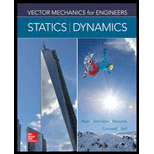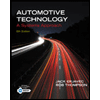
Vector Mechanics for Engineers: Statics and Dynamics
11th Edition
ISBN: 9780073398242
Author: Ferdinand P. Beer, E. Russell Johnston Jr., David Mazurek, Phillip J. Cornwell, Brian Self
Publisher: McGraw-Hill Education
expand_more
expand_more
format_list_bulleted
Concept explainers
Question
Chapter 18.2, Problem 18.71P
(a)
To determine
The resulting angular acceleration of the assembly.
(b)
To determine
Find the dynamic reactions at C and D immediately after the couple is applied.
Expert Solution & Answer
Want to see the full answer?
Check out a sample textbook solution
Students have asked these similar questions
this is an old practice exam, the answer is Ax = -4, Ay = -12,Az = 32.5, Bx= 34, Bz = 5, By = 0 but how?
This is an old practice exam, the answer is Ax = Az = 0, Ay = 2000, TDE = 4750, Cx = 2000, Cy = 2000, Cz = -800 but how?
this is an old practice exam, the answer is Fmin = 290.5lb but how
Chapter 18 Solutions
Vector Mechanics for Engineers: Statics and Dynamics
Ch. 18.1 - A thin, homogeneous disk of mass m and radius r...Ch. 18.1 - Prob. 18.2PCh. 18.1 - 18.3 Two uniform rods AB and CE, each of weight 3...Ch. 18.1 - A homogeneous disk of weight W = 6 lb rotates at...Ch. 18.1 - Prob. 18.5PCh. 18.1 - A solid rectangular parallelepiped of mass m has a...Ch. 18.1 - Prob. 18.8PCh. 18.1 - Determine the angular momentum HD of the disk of...Ch. 18.1 - Prob. 18.10PCh. 18.1 - Prob. 18.11P
Ch. 18.1 - Prob. 18.12PCh. 18.1 - Prob. 18.13PCh. 18.1 - Two L-shaped arms each have a mass of 5 kg and are...Ch. 18.1 - For the assembly of Prob. 18.15, determine (a) the...Ch. 18.1 - Prob. 18.17PCh. 18.1 - Determine the angular momentum of the shaft of...Ch. 18.1 - Prob. 18.20PCh. 18.1 - Prob. 18.21PCh. 18.1 - Prob. 18.22PCh. 18.1 - Prob. 18.23PCh. 18.1 - Prob. 18.24PCh. 18.1 - Prob. 18.25PCh. 18.1 - Prob. 18.26PCh. 18.1 - Prob. 18.27PCh. 18.1 - Prob. 18.28PCh. 18.1 - A circular plate of mass m is falling with a...Ch. 18.1 - Prob. 18.30PCh. 18.1 - Prob. 18.31PCh. 18.1 - Determine the impulse exerted on the plate of...Ch. 18.1 - The coordinate axes shown represent the principal...Ch. 18.1 - Prob. 18.34PCh. 18.1 - Prob. 18.37PCh. 18.1 - Prob. 18.38PCh. 18.1 - Prob. 18.39PCh. 18.1 - Prob. 18.40PCh. 18.1 - Prob. 18.41PCh. 18.1 - Prob. 18.42PCh. 18.1 - Prob. 18.43PCh. 18.1 - Determine the kinetic energy of the solid...Ch. 18.1 - Prob. 18.45PCh. 18.1 - Determine the kinetic energy of the disk of Prob....Ch. 18.1 - Determine the kinetic energy of the assembly of...Ch. 18.1 - Determine the kinetic energy of the shaft of Prob....Ch. 18.1 - Prob. 18.49PCh. 18.1 - Prob. 18.50PCh. 18.1 - Determine the kinetic energy lost when edge C of...Ch. 18.1 - Prob. 18.52PCh. 18.1 - Prob. 18.53PCh. 18.1 - Determine the kinetic energy of the space probe of...Ch. 18.2 - Determine the rate of change HG of the angular...Ch. 18.2 - Prob. 18.56PCh. 18.2 - Prob. 18.57PCh. 18.2 - Prob. 18.58PCh. 18.2 - Prob. 18.59PCh. 18.2 - Determine the rate of change HG of the angular...Ch. 18.2 - 18.61 Determine the rate of change of the angular...Ch. 18.2 - Prob. 18.62PCh. 18.2 - Prob. 18.63PCh. 18.2 - Prob. 18.64PCh. 18.2 - A slender, uniform rod AB of mass m and a vertical...Ch. 18.2 - Prob. 18.66PCh. 18.2 - The assembly shown consists of pieces of sheet...Ch. 18.2 - The 8-kg shaft shown has a uniform cross-section....Ch. 18.2 - Prob. 18.69PCh. 18.2 - Prob. 18.70PCh. 18.2 - Prob. 18.71PCh. 18.2 - Knowing that the plate of Prob. 18.66 is initially...Ch. 18.2 - Prob. 18.73PCh. 18.2 - The shaft of Prob. 18.68 is initially at rest ( =...Ch. 18.2 - The assembly shown weighs 12 lb and consists of 4...Ch. 18.2 - Prob. 18.76PCh. 18.2 - Prob. 18.79PCh. 18.2 - Prob. 18.80PCh. 18.2 - Prob. 18.81PCh. 18.2 - Prob. 18.82PCh. 18.2 - The uniform, thin 5-lb disk spins at a constant...Ch. 18.2 - The essential structure of a certain type of...Ch. 18.2 - Prob. 18.85PCh. 18.2 - Prob. 18.86PCh. 18.2 - Prob. 18.87PCh. 18.2 - The 2-lb gear A is constrained to roll on the...Ch. 18.2 - Prob. 18.89PCh. 18.2 - Prob. 18.90PCh. 18.2 - 18.90 and 18.91The slender rod AB is attached by a...Ch. 18.2 - The essential structure of a certain type of...Ch. 18.2 - The 10-oz disk shown spins at the rate 1 = 750...Ch. 18.2 - Prob. 18.94PCh. 18.2 - Prob. 18.95PCh. 18.2 - Two disks each have a mass of 5 kg and a radius of...Ch. 18.2 - Prob. 18.97PCh. 18.2 - Prob. 18.98PCh. 18.2 - A thin disk of mass m = 4 kg rotates with an...Ch. 18.2 - Prob. 18.101PCh. 18.2 - Prob. 18.102PCh. 18.2 - A 2.5-kg homogeneous disk of radius 80 mm rotates...Ch. 18.2 - A 2.5-kg homogeneous disk of radius 80 mm rotates...Ch. 18.2 - For the disk of Prob. 18.99, determine (a) the...Ch. 18.3 - A uniform thin disk with a 6-in. diameter is...Ch. 18.3 - A uniform thin disk with a 6-in. diameter is...Ch. 18.3 - Prob. 18.109PCh. 18.3 - The top shown is supported at the fixed point O...Ch. 18.3 - Prob. 18.111PCh. 18.3 - Prob. 18.112PCh. 18.3 - Prob. 18.113PCh. 18.3 - A homogeneous cone with a height of h = 12 in. and...Ch. 18.3 - Prob. 18.115PCh. 18.3 - Prob. 18.116PCh. 18.3 - Prob. 18.117PCh. 18.3 - Prob. 18.118PCh. 18.3 - Prob. 18.119PCh. 18.3 - Prob. 18.120PCh. 18.3 - Prob. 18.121PCh. 18.3 - Prob. 18.122PCh. 18.3 - Prob. 18.123PCh. 18.3 - A coin is tossed into the air. It is observed to...Ch. 18.3 - Prob. 18.125PCh. 18.3 - Prob. 18.126PCh. 18.3 - Prob. 18.127PCh. 18.3 - Prob. 18.128PCh. 18.3 - Prob. 18.129PCh. 18.3 - Prob. 18.130PCh. 18.3 - Prob. 18.131PCh. 18.3 - Prob. 18.132PCh. 18.3 - Prob. 18.133PCh. 18.3 - Prob. 18.134PCh. 18.3 - Prob. 18.135PCh. 18.3 - A homogeneous disk with a radius of 9 in. is...Ch. 18.3 - The top shown is supported at the fixed point O....Ch. 18.3 - Prob. 18.138PCh. 18.3 - Prob. 18.139PCh. 18.3 - Prob. 18.140PCh. 18.3 - Prob. 18.141PCh. 18.3 - Prob. 18.142PCh. 18.3 - Consider a rigid body of arbitrary shape that is...Ch. 18.3 - Prob. 18.144PCh. 18.3 - Prob. 18.145PCh. 18 - Three 25-lb rotor disks are attached to a shaft...Ch. 18 - Prob. 18.148RPCh. 18 - Prob. 18.149RPCh. 18 - A uniform rod of mass m and length 5a is bent into...Ch. 18 - Prob. 18.151RPCh. 18 - Prob. 18.152RPCh. 18 - Prob. 18.153RPCh. 18 - Prob. 18.154RPCh. 18 - Prob. 18.155RPCh. 18 - The space capsule has no angular velocity when the...Ch. 18 - Prob. 18.157RPCh. 18 - The essential features of the gyrocompass are...
Knowledge Booster
Learn more about
Need a deep-dive on the concept behind this application? Look no further. Learn more about this topic, mechanical-engineering and related others by exploring similar questions and additional content below.Similar questions
- This is an exam review question. The answer is Pmin = 622.9 lb but whyarrow_forwardPlease do not use any AI tools to solve this question. I need a fully manual, step-by-step solution with clear explanations, as if it were done by a human tutor. No AI-generated responses, please.arrow_forwardPlease do not use any AI tools to solve this question. I need a fully manual, step-by-step solution with clear explanations, as if it were done by a human tutor. No AI-generated responses, please.arrow_forward
- Please do not use any AI tools to solve this question. I need a fully manual, step-by-step solution with clear explanations, as if it were done by a human tutor. No AI-generated responses, please.arrow_forwardThis is an old practice exam. Fce = 110lb and FBCD = 62 lb but whyarrow_forwardQuiz/An eccentrically loaded bracket is welded to the support as shown in Figure below. The load is static. The weld size for weld w1 is h1 = 4mm, for w2 h2 = 6mm, and for w3 is h3 =6.5 mm. Determine the safety factor (S.f) for the welds. F=29 kN. Use an AWS Electrode type (E100xx). 163 mm S 133 mm 140 mm Please solve the question above I solved the question but I'm sure the answer is wrong the link : https://drive.google.com/file/d/1w5UD2EPDiaKSx3W33aj Rv0olChuXtrQx/view?usp=sharingarrow_forward
- Q2: (15 Marks) A water-LiBr vapor absorption system incorporates a heat exchanger as shown in the figure. The temperatures of the evaporator, the absorber, the condenser, and the generator are 10°C, 25°C, 40°C, and 100°C respectively. The strong liquid leaving the pump is heated to 50°C in the heat exchanger. The refrigerant flow rate through the condenser is 0.12 kg/s. Calculate (i) the heat rejected in the absorber, and (ii) the COP of the cycle. Yo 8 XE-V lo 9 Pc 7 condenser 5 Qgen PG 100 Qabs Pe evaporator PRV 6 PA 10 3 generator heat exchanger 2 pump 185 absorberarrow_forwardQ5:(? Design the duct system of the figure below by using the balanced pressure method. The velocity in the duct attached to the AHU must not exceed 5m/s. The pressure loss for each diffuser is equal to 10Pa. 100CFM 100CFM 100CFM ☑ ☑ 40m AHU -16m- 8m- -12m- 57m 250CFM 40m -14m- 26m 36m ☑ 250CFMarrow_forwardA mass of ideal gas in a closed piston-cylinder system expands from 427 °C and 16 bar following the process law, pv1.36 = Constant (p times v to the power of 1.36 equals to a constant). For the gas, initial : final pressure ratio is 4:1 and the initial gas volume is 0.14 m³. The specific heat of the gas at constant pressure, Cp = 0.987 kJ/kg-K and the specific gas constant, R = 0.267 kJ/kg.K. Determine the change in total internal energy in the gas during the expansion. Enter your numerical answer in the answer box below in KILO JOULES (not in Joules) but do not enter the units. (There is no expected number of decimal points or significant figures).arrow_forward
- my ID# 016948724. Please solve this problem step by steparrow_forwardMy ID# 016948724 please find the forces for Fx=0: fy=0: fz=0: please help me to solve this problem step by steparrow_forwardMy ID# 016948724 please solve the proble step by step find the forces fx=o: fy=0; fz=0; and find shear moment and the bending moment diagran please draw the diagram for the shear and bending momentarrow_forward
arrow_back_ios
SEE MORE QUESTIONS
arrow_forward_ios
Recommended textbooks for you
 International Edition---engineering Mechanics: St...Mechanical EngineeringISBN:9781305501607Author:Andrew Pytel And Jaan KiusalaasPublisher:CENGAGE L
International Edition---engineering Mechanics: St...Mechanical EngineeringISBN:9781305501607Author:Andrew Pytel And Jaan KiusalaasPublisher:CENGAGE L Automotive Technology: A Systems Approach (MindTa...Mechanical EngineeringISBN:9781133612315Author:Jack Erjavec, Rob ThompsonPublisher:Cengage Learning
Automotive Technology: A Systems Approach (MindTa...Mechanical EngineeringISBN:9781133612315Author:Jack Erjavec, Rob ThompsonPublisher:Cengage Learning

International Edition---engineering Mechanics: St...
Mechanical Engineering
ISBN:9781305501607
Author:Andrew Pytel And Jaan Kiusalaas
Publisher:CENGAGE L

Automotive Technology: A Systems Approach (MindTa...
Mechanical Engineering
ISBN:9781133612315
Author:Jack Erjavec, Rob Thompson
Publisher:Cengage Learning
Dynamics - Lesson 1: Introduction and Constant Acceleration Equations; Author: Jeff Hanson;https://www.youtube.com/watch?v=7aMiZ3b0Ieg;License: Standard YouTube License, CC-BY